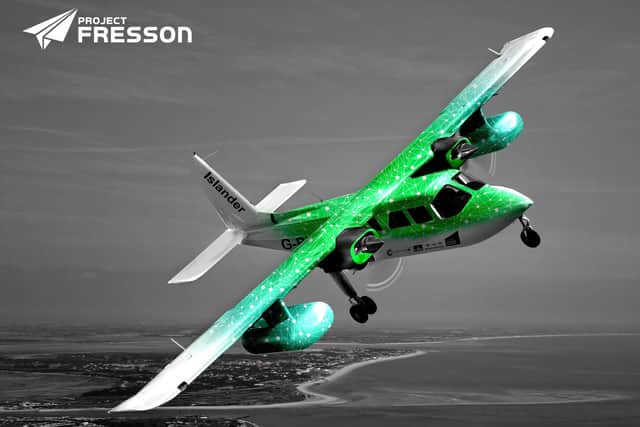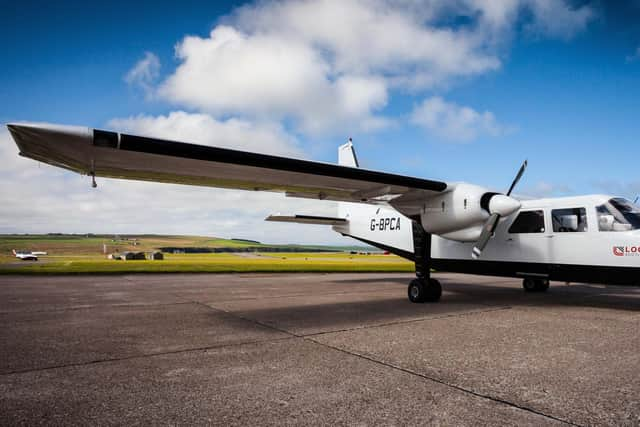World’s first hydrogen-powered passenger flights could take off in Orkney
A nine-passenger aircraft similar to the ones used by Loganair in Orkney for the islands’ council is being fitted with a Scottish-designed hydrogen tank for the test flights.
They are planned for September next year at Cranfield Aerospace Solutions (CAS), which is leading the project, in Bedfordshire.
Advertisement
Hide AdAdvertisement
Hide AdOnly a test pilot and flight engineer will be on board, but the demonstration could be followed by commercial flights initially carrying up to seven people from late 2023.


CAS chief executive Paul Hutton said: “This project can deliver the world’s first truly ‘green’ passenger-carrying airline services.
"This has every likelihood of being the first passenger-carrying green aircraft service in operation.”
The venture has been named Project Fresson after Scottish aviation pioneer Ted Fresson, who launched the first passenger flights to Orkney in 1933.
Another group, ZeroAvia, flew a six-seater aircraft from Cranfield last September, which it described as the “world-first hydrogen fuel cell-powered flight of a commercial-grade aircraft”.


The Project Fresson consortium said other Britten-Norman Islander aircraft like the one in the trial could be converted to run on hydrogen.
Loganair flies two in Orkney between Kirkwall and North Ronaldsay, Papa Westray, Westray, Sanday, Stronsay and Eday.
Other operators of the aircraft include Airtask, which runs flights within Shetland for the islands’ council, and Hebridean Air Services in the Western Isles,
Advertisement
Hide AdAdvertisement
Hide AdHydrogen could even be produced at island airports using wind or tidal energy generated nearby.
CAS said hydrogen was both zero emission and more cost effective than traditional aviation fuel, potentially saving up to £300,000 per aircraft annually.
Flights are also likely to be much quieter for passengers because the aircraft’s piston engine will be removed.
Mr Hutton said the projectoriginally planned to use electric battery power, but it found hydrogen had longer range and be more cost effective.
He said: "With the hydrogen fuel cell option, not only are you completely green, but because of the cost savings you are making from the reduced cost of the amount of hydrogen you are using compared to the amount of Avgas (aviation gasoline), there are significant commercial benefits."
Companies involved in the project include Ayrshire-based Innovatus Technologies, which will fit its ultra lightweight “Scottish hydrogen fuel tank” to the aircraft.
Business development director Stuart McIntyre said: “It allows us to establish a pre-eminent Scottish lead in the manufacture and design of innovative hydrogen tanks to enable this green propulsion revolution.
"We are taking an aircraft that is already in commercial service, with very important roles for the communities it serves, and making it able to fly those services on a fully green basis.”
Advertisement
Hide AdAdvertisement
Hide AdAndy Smith, head of sustainability strategy at Loganair, said: “As a partner on Project Fresson, we are proud to be working with the consortium to develop a low-emission powertrain for the aircraft which we operate from Kirkwall, serving the islands of Orkney.
“We are extremely pleased to see Project Fresson advance and we look forward to introducing the first low-emission Islander aircraft into service.”
Jenny Kavanagh, CAS’s chief strategy officer, said: “We definitely foresee that hydrogen will be used in larger aircraft in future.”
Guillaume Faury, chief executive of Airbus, the world’s biggest aircraft manufacturer, today agreed hydrogen “will play a big role and a growing role”.
It plans to launch a hydrogen aircraft carrying 100-200 people by 2035.
A message from the Editor:
Thank you for reading this article. We're more reliant on your support than ever as the shift in consumer habits brought about by Coronavirus impacts our advertisers.
If you haven't already, please consider supporting our trusted, fact-checked journalism by taking out a digital subscription.
Comments
Want to join the conversation? Please or to comment on this article.